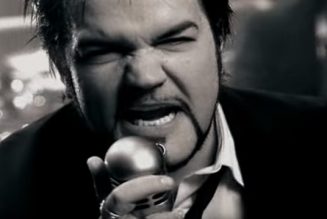
Jeremy Bolm has spent the past decade striving to live up to the example set by his own words. The music he makes with his band, Touché Amoré, compels guys with neck tattoos to spend a half hour irresponsibly slamming into fellow fans before they corner Bolm after the show and reveal how they felt truly seen by “And Now It’s Happening In Mine.” He’ll be the first to tell you about the ways he falls short: 2013’s Is Survived By explored Bolm’s struggles with the pressures of being in a profoundly impactful (but not famous) hardcore band, which brought even greater success and demands. Bolm missed his mother’s dying day because he was “on stage living the dream” at Fest in Florida. He atoned by making an entire album about her passing from stage 4 breast cancer. This entire history is summarized on “I’ll Be Your Host,” the second single from their phenomenal fifth album Lament, wherein Bolm recognizes the privilege of his platform and the common misconception that he can singlehandedly walk people through their grieving process because he made a great hardcore record about not knowing how to grieve. It’s a long overdue revelation that he alone can’t be there for everyone at all times, which makes Lament their capstone—a Touché Amoré album that can reach the most people as possible from the greatest distance.
To hear Touché Amoré tell it, they had no choice but to work with famed heavy metal producer Ross Robinson if they were going to make this kind of record. Infamously intense and hands-on, Robinson’s anti-Rick Rubin approach irrevocably changed the course of popular metal by enabling chaotic and highly unconventional acts like Korn, Slipknot, and Limp Bizkit to focus their live intensity without compromising to reach suburban adolescents like Bolm—“I saw the ‘Blind’ music video on a local music video channel,” he recently recalled. “And my fucking brain fell out of my head.”
More germane to Touché Amoré, Robinson was also behind the boards for Blood Brothers’ Burn, Piano Island, Burn, Glassjaw’s Worship and Tribute, and the motherlode, Relationship of Command, all wildly ambitious records that pushed already revered post-hardcore bands dangerously close to mainstream success and shortly thereafter, their demise. “Ross is known for two things, getting a drummer replaced or kicked out and making the singer cry,” Bolm joked.
Opener “Come Heroine” does a lot of things that are familiar to Touché Amoré—Bolm begins screaming off-mic; the band launches into a bucking, double-time thrash; they pull back during the verse and rev up the circle pit again. Every single second of “Come Heroine” does these things more emphatically than previous Touché Amoré songs, the intended result of a band with enough time, enough confidence, and enough resources to push everything by 10-20 percent more. The tempo slows noticeably between the verse and the bridge; the time signature shifts subtly; the guitars are newly textured to variously evoke shoegaze and Morricone. As an instrumental alone, “Come Heroine” would feel like a song about interrogating familiar patterns and being open to unexpected inspiration, but then Bolm’s lyrics confirm it’s definitely about that—“When I thought I saw everything,” he intones before returning to his howl, “I SAW YOU!”
Touché Amoré albums usually reserve one or two songs that push their reliably cathartic and anthemic melodic post-hardcore towards something as outright accessible as, say, the National. Lament asks, why not make that every song? “A Broadcast” lingers in a Leonard Cohen afterworld, averting a typically bellowing chorus for an ’00-indie chorale. On album closer “A Forecast,” Bolm sings bravely and rhymes bluntly over twinkling piano chords, which isn’t even the most shocking part of the song. “The funniest Touché Amoré song” doesn’t evoke a lot of competition, but “the most uncomfortably revealing Touché Amoré song” does, and “A Forecast” somehow manages to be both as Bolm airs out resentments over the way he felt abandoned by family, friends, bandmates and even Epitaph Records after Stage Four—“It’s not like I wrote some lyrics/Detailing the exact events/Some profit off the album/Most I just consider friends”; “I’ve lost more family members/Not to cancer but the GOP/What’s the difference I’m not for certain/They all end up dead to me.”
If Lament had come out in 2000, “Reminders” could have been their “One Armed Scissor” or “Pretty Lush,” a Trojan horse of a single that landed them on MTV2 and late-night shows. There’s no Touché Amoré song quite like it, a straight-up pop-punk singalong that’s just as goofy enough to be convincing and lyrically devastating enough to be what it really is: an otherwise prototypical Touché Amoré song about trying to find simple pleasures in friendship (human or otherwise) when nihilism feels far more appealing.
Touché Amoré’s influences on Lament are not obscure—they made a “What’s Inspiring Album Five” Spotify playlist that included the softest Deftones song, the heaviest Real Estate one, and soft-rock staples from Orleans and Mike and the Mechanics. None of these reference points are illogical—country music shares hardcore’s proclivity for lyrical directness, while contemplative indie rock adds some silver accents to their blackened bleakness. Lament even makes a sensible kinship with Counting Crows, another metropolitan, California band whose existential yearning can pass for humble heartland rock. “Suffering has no purpose, ‘Round Here’ is an almost perfect song,” Bolm yells on “Exit Row,” and we’re all poorer for missing out on the opportunity to hear a crowd repeat “ALMOST!” like Bolm does a second later.
In the midst of all of this atypical Touché Amoré music, the very atypical lead single “Limelight” now feels at home. At 5:03, it’s by far the longest song they’ve ever made—over the previous 12 years, exactly one Touché Amoré song has surpassed four minutes. The handclaps and backup shouts on the chorus sound like they’re being pumped from a Jumbotron. At a point where most Touché Amoré songs would stop cold, Manchester Orchestra’s Andy Hull comes in with his instantly recognizable twang, an apt segue to a coda showing off Nick Steinhardt’s newly acquired pedal steel skills. It’s a sequel of sorts to Is Survived By’s “To Write Content,” where Bolm recalled a conversation he had with Hull about whether their personal happiness would eventually become a liability for their bands.
Seven years later, Hull’s music pops up in Hollywood films and Whole Foods, his commercial breakthrough coming on an album inspired by the birth of his first child. Touché Amoré have played Coachella, they created custom guitar pedals, and got signed to Roc Nation. Maybe the ceiling isn’t that much higher for a post-hardcore band in 2020. Bolm takes a hard look at everything he once romanticized on “Limelight”—“saying no just for the thrill,” public adulation—mourns his recently deceased dogs, and reflects on nights that go by without him and his partner sharing a kiss. But rather than being a self-pitying dirge for washed hardcore guys, it’s empowerment for anyone who’s feeling a little burnt out by anything that used to mean everything. A call to find new fires that will blaze slower and longer. For a band spooked by their status as role models, Touché Amoré still can’t help but lead by example.
Buy: Rough Trade
(Pitchfork earns a commission from purchases made through affiliate links on our site.)
Catch up every Saturday with 10 of our best-reviewed albums of the week. Sign up for the 10 to Hear newsletter here.










